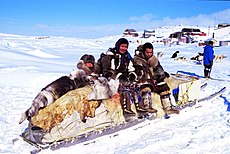Inuit people
 Traditional qamutik (sled), Cape Dorset, Nunavut |
|
| Total population | |
|---|---|
| (134,241) | |
| Regions with significant populations | |
| Greenland: 51,365 Canada: 50,480 United States: 16,581 Denmark (mainland): 15,815 |
|
| Languages | |
| Greenlandic, Inuktitut, and other Inuit languages, Danish, English, French, Inuiuuk and various others | |
| Religion | |
| Christianity, Inuit religion | |
| Related ethnic groups | |
| Aleut and Yupik peoples |
Inuit (pronounced /ˈɪnu.ɪt/ or /ˈɪnju.ɪt/; Inuktitut: , "the people") are a group of culturally similar indigenous peoples inhabiting the Arctic regions of Greenland, Canada and Alaska. Inuit is a plural noun; the singular is Inuk. The Inuit languages are part of the Eskimo-Aleut family.Inuit Sign Language is a critically endangered language isolate spoken in Nunavut.
In the United States and Canada, the term "Eskimo" was commonly used to describe the Inuit and Alaska's Yupik and Iñupiat peoples. However, "Inuit" is not accepted as a term for the Yupik, and "Eskimo" is the only term that includes Yupik, Iñupiat and Inuit. However, aboriginal peoples in Canada and Greenlandic Inuit view "Eskimo" as pejorative, and "Inuit" is more commonly used in self-reference for these groups. In Canada, sections 25 and 35 of the Constitution Act of 1982 classified the "Inuit" as a distinctive group of Aboriginal Canadians who are not included under either the First Nations or the Métis.
...
Wikipedia
